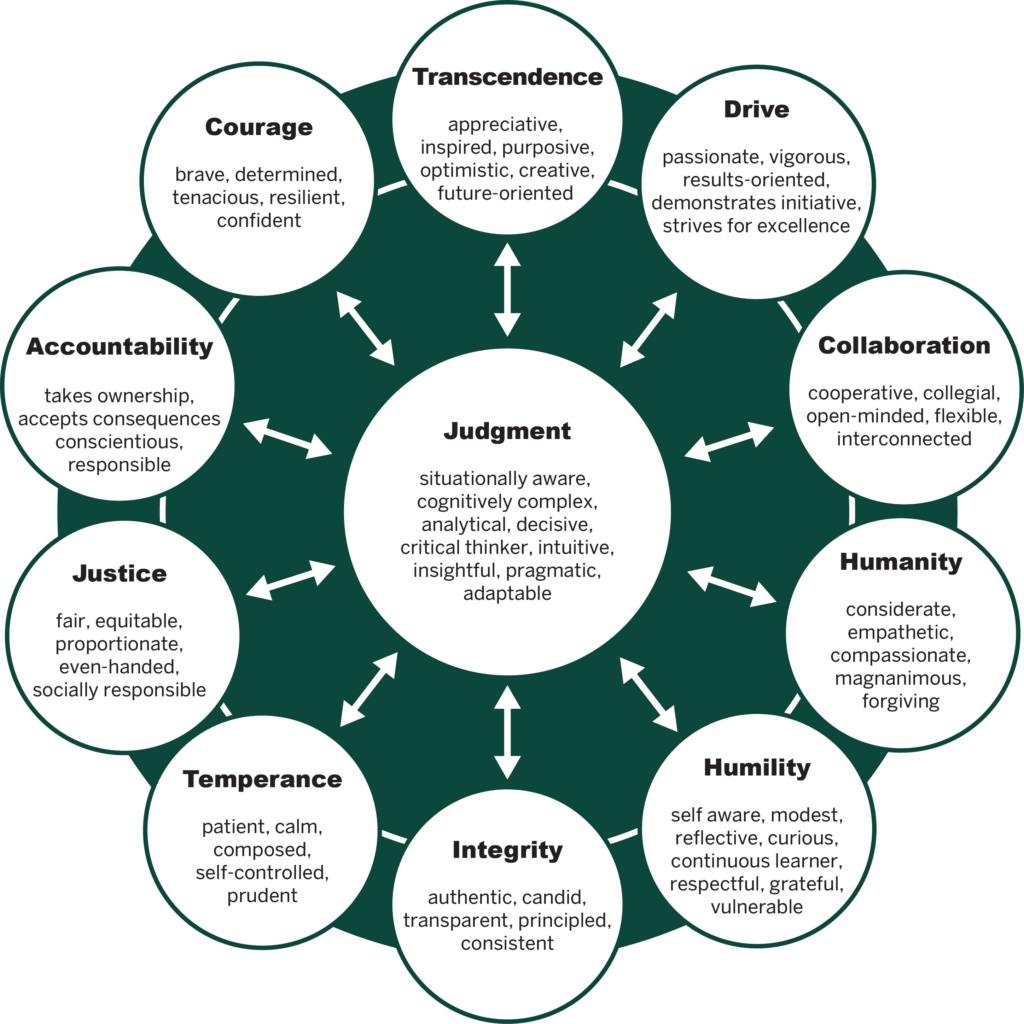By:…
Why Leader Character Matters: A Game Changer for Business Success
How deepening leader character can transform company culture, enhance decision-making, and drive superior performance.

What really differentiates successful companies from the rest? It might be something less tangible than financial strategies or market positioning — it’s the character of their leaders. The Leader Character Framework has been developed not just to enhance leadership skills, but to fundamentally transform them.
Created by Mary Crossan, Gerard Seijts, and Jeffrey Gandz at the Ivey Business School, the Leader Character Framework outlines a set of character dimensions that are foundational for leaders who not only aim to succeed but also aspire to lead with integrity and vision. These dimensions are not just personal traits, but are strategic levers that can propel businesses to new levels of success.
Exploring the Dimensions of Leader Character
1. Judgment: The Core of Decision-Making Judgment is crucial in leadership as it involves making sound decisions based on critical analysis and relevant information. Leaders with strong judgment appreciate broader contexts and remain flexible when new information emerges. This dimension is especially vital in navigating complex, ambiguous scenarios often encountered in the business world.
2. Courage: The Strength to Stand Alone Courage in leadership means doing the right thing even when it is unpopular or discouraged. This dimension is about showing determination and perseverance, and quickly rebounding from setbacks. Courageous leaders drive change and encourage innovation by challenging the status quo and embracing risks.
3. Drive: Fuel for Achievement Drive is the relentless pursuit of excellence and the passion to tackle problems with urgency. Leaders with high drive are not just goal-oriented, but are also deeply passionate about their work, pushing their teams towards achieving collective aspirations.
4. Collaboration: Creating Synergies Collaboration is essential for fostering positive relationships and encouraging open dialogue. It involves connecting with others fundamentally to share ideas productively. This dimension emphasizes the impact of collective efforts over individual achievements.
5. Integrity: The Foundation of Trust Integrity involves adhering to high moral standards and behaving ethically, even under pressure. Leaders who display integrity are consistent with their personal values and organizational policies, earning them trust and respect from their peers and subordinates.
6. Temperance: Balancing Emotions Temperance is about maintaining composure and thinking clearly even in tense situations. Leaders who practice temperance solve problems thoughtfully and avoid extremes, providing a stable environment for their teams.
7. Accountability: Owning Decisions and Actions Accountability in leadership means willingly accepting responsibility for one’s actions and decisions. Leaders who are accountable do not shirk from their duties, especially in challenging situations, ensuring reliability and trustworthiness.
8. Justice: Ensuring Fairness Justice involves striving to treat individuals fairly and ensuring that consequences are commensurate with actions. Leaders who prioritize justice remain objective, minimize biases in decision-making, and are vocal advocates for fairness within and outside their organizations.
9. Humility: Embracing Growth Humility in leadership is about letting one’s accomplishments speak for themselves and acknowledging one’s limitations. Humble leaders are open to feedback, respect others’ contributions, and are committed to personal and professional growth.
10. Humanity: Compassion in Leadership Humanity is showing genuine concern for others and appreciating their values and feelings. Leaders who exhibit humanity foster an inclusive, supportive work environment where individuals are encouraged to learn from their mistakes.
11. Transcendence: Inspiring Beyond the Ordinary Transcendence in leadership is about drawing inspiration from excellence and beauty in various domains like sports, music, and arts, seeing possibilities where others see none. Leaders who embody transcendence demonstrate a profound sense of purpose and are able to inspire their teams to pursue greatness.
The Strategic Impact of Leader Character
Integrating these dimensions of character into business practices goes beyond ethical considerations — it’s a strategic approach that enhances decision-making, fosters innovation, and builds resilient organizational cultures. Businesses that prioritize leader character development report not only higher ethical standards but also improved financial performance.
As businesses continue to navigate an increasingly complex world, the importance of leader character becomes more evident. Companies investing in the development of these character dimensions are more likely to thrive, innovate, and maintain competitive advantages.
Women…
New Survey Reveals that Almost 80 per cent of Women Face Ageism in the Workplace
You…
You Need to Meet: Dr. Dana Sinclair, a Performance Psychologist Helping Athletes and Professionals Excel
By:…
Adapting Leadership: Why Traditional Models Fall Short in Today’s Dynamic Workforce
By…
Empowering Black Women Entrepreneurs: A Call to Action for Women Executives
You…


